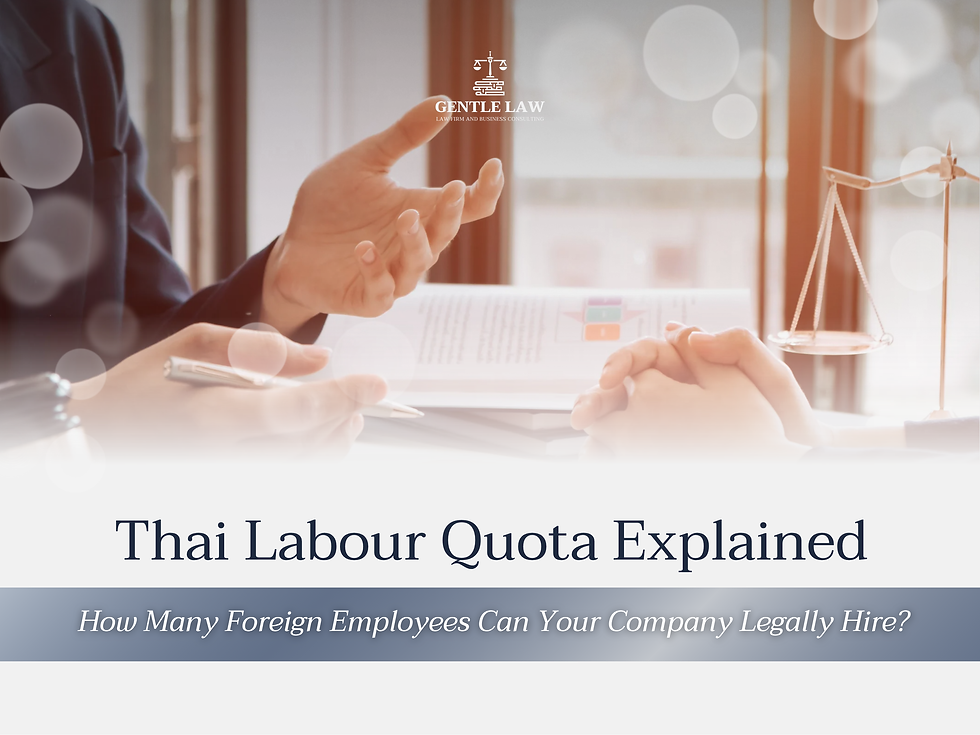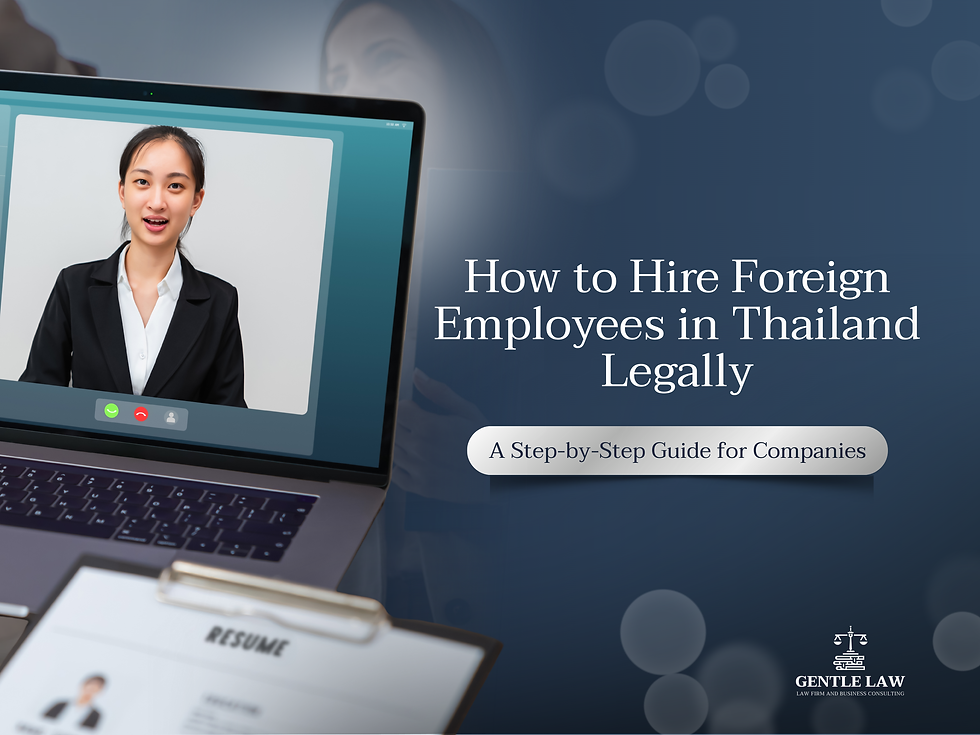How to Hire Foreign Employees in Thailand: A Step-by-Step Compliance Guide for SMEs
- gentlelawlawfirm
- Aug 31, 2025
- 3 min read
Updated: Sep 1, 2025

Intro
Hiring internationally can accelerate growth, but Thailand has strict rules on who can “work”, when a work permit is required, and how employers must qualify. This guide by GENTLE LAW IBL explains the legal framework and a practical process to hire foreign employees in Thailand while reducing risk for SME employers. Key points are grounded in the Emergency Decree on Managing the Work of Aliens and current administrative practice, with reputable sources cited.
1) Legal framework you must know to hire foreign employees in Thailand
Work permit is required if a foreigner performs work in Thailand. “Work” is interpreted broadly. Operating without a work permit can trigger fines or criminal penalties under the Emergency Decree on Managing the Work of Aliens B.E. 2560 and its amendments.
Visa status matters. Foreign staff typically hold a Non-Immigrant B visa prior to obtaining the work permit; visa and work permit must stay aligned throughout employment.
Prohibited occupations. Some roles are reserved for Thai nationals. Always confirm that the job is not on the prohibited list before you attempt to hire foreign employees in Thailand.
2) Employer qualifications to hire foreign employees in Thailand
For standard, non-BOI companies, authorities look at employer capacity before issuing or extending work permits:
Paid-up capital threshold: a common yardstick is at least THB 2 million in capital for each foreign employee.
Thai staff ratio: immigration practice commonly requires at least 4 Thai employees per 1 foreign employee for Non-B extensions at many offices. Always verify locally because internal orders and province-level practice can vary over time.
Tip: If you cannot presently meet the capital or headcount threshold, consider BOI promotion pathways in Section 6 below.
3) Who needs a work permit
Company directors who sign documents, manage operations, or represent the company are treated as “working” and need a permit unless a specific scheme applies.
Passive shareholders who do not perform any work do not need a permit.
Volunteers and unpaid contributors still need a permit if their actions constitute “work” under the Decree.
4) The step-by-step hiring process
Step 1: Role scoping and prohibition check Confirm the job is allowed for foreigners and that you can meet employer qualifications to hire foreign employees in Thailand.
Step 2: Visa track Candidate applies for a Non-Immigrant B visa with supporting corporate documents and draft employment terms. Keep the visa validity aligned with your onboarding timeline.
Step 3: Work permit application File through the Ministry of Labour’s Department of Employment with position details, job description, corporate records, and evidence of capital and Thai staff. Maintain consistent job title, duties, and workplace across all filings.
Step 4: After approval
Keep the original work permit at the place of work.
Update Immigration records consistently with any job, address, or employer changes.
Renew visa and work permit together before expiry.
5) Documentation you will typically prepare
Company affidavit and list of shareholders
Paid-up capital evidence and Thai staff payroll records
Lease or evidence of business premises
Employment contract and job description
Tax and social security registrations supporting your ability to hire foreign employees in Thailand Sources outline these document categories and employer-capacity tests.
6) BOI options and when rules are more flexible
BOI-promoted companies often receive facilitation on visa and work authorizations, with more flexibility than standard employer tests.
Smart Visa program for investors, executives, and experts in targeted industries can allow working without a separate work permit, subject to BOI endorsement and program conditions. Always confirm category-specific requirements.
7) Compliance pitfalls to avoid
Assuming a director title removes the need for a work permit.
Filing with a job title that does not match actual duties or a role on the prohibited list.
Under-capitalizing or failing to maintain the Thai-to-foreigner headcount, then discovering at renewal that you cannot keep your Non-B extension.
Letting visa expire before work permit renewal or vice versa.
8) Best practices for SME employers
Map the full timeline from visa application to Day-1 at work and build buffers.
Keep payroll, social security, and tax filings consistent with headcount claims used to hire foreign employees in Thailand.
Maintain bilingual HR files and signed job descriptions that match permit details.
Recheck rules every renewal cycle because administrative practice can change by office.
How GENTLE LAW IBL can help
We support SMEs with:
Hiring strategy and eligibility checks to hire foreign employees in Thailand lawfully
Visa and work permit applications, renewals, and amendments
BOI structuring and Smart Visa readiness
HR compliance audits and director training
Planning to hire foreign employees in Thailand for your next growth phase?
Contact GENTLE LAW IBL for a readiness review and full-service support: gentlelawibl.com



